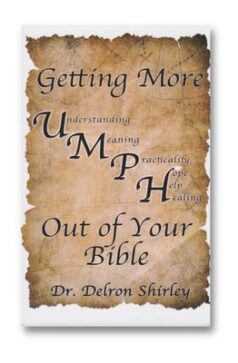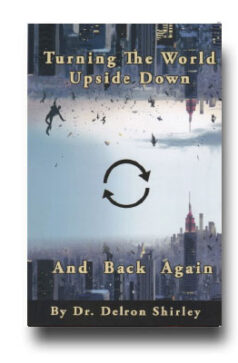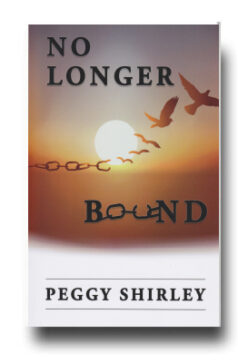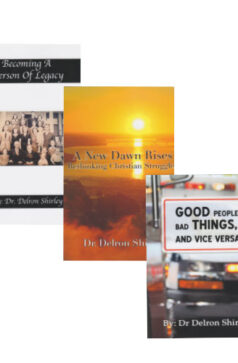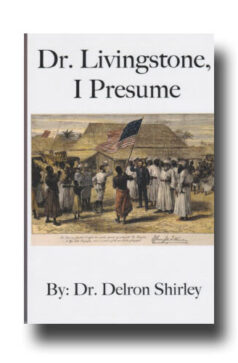We can approach many of the motivational ideas in life — such as setting goals, making or setting standards, and accomplishing things for the kingdom of God — in somewhat of an academic attitude. We can say, “Yea, that’s the way it ought to be done. Somebody ought to do it.” But sometimes we tend to forget that we can be the ones who can do it. Sometimes we tend to think, “Somebody else can do that,” or look at our neighbor or someone who has already made his mark in society and say, “For sure, he could do it.” But somehow, we have the tendency to put our own selves in a different category saying, “I don’t really think I can do it.” We don’t try because we don’t see ourselves as the people who can make it work or because we see the task as too big for us. I want to share with you a story from the Bible to help you grasp what God can do through people whom the world would label as “losers” — with a capital “L.” If God used the woman in this story, He can use anyone — even you or me!
Joshua chapter two tells the story of how Rahab the harlot hid the Israelite spies who came to Jericho on a recognizance mission. When she knew that the soldiers were coming to search for the intruders, she took them to the roof of her house and had them lie down among some bundles of flax that she had put out to dry in the sun. As Rahab covered them so as to secure their safety, she was thinking more of her own safety. Her request of these strangers was,
I know that the Lord has given you the land and that the terror of you has fallen on us and that all the inhabitants of the land are fainthearted because of you. For we have heard how the Lord dried up the water of the Red Sea for you when you came out of Egypt and what you did to the two kings of the Ammorites who were on the other side of the Jordan, Sihon and Og, whom you utterly destroyed. And as soon as we heard these things, our hearts melted. Neither did there remain any more courage in anyone because of you. For the Lord your God, he is God in heaven above and on earth beneath. Now, therefore, I beg you, swear to me by the Lord since I have sworn you kindness that you also will show kindness to my father’s house and give me a true token, and spare my father and my mother, my brothers and my sisters and all that they have and deliver our lives from death. (verses 9-13)
The spies gave her a solemn pledge,
Our lives for yours if none of you tell this business of ours and it shall be when the Lord has given us the land that we will deal kindly and truly with you…We will be blameless of this oath of yours which you have made us swear unless when we have come into the land that you bind this line of scarlet cord in the window through which you let us down and unless you bring your father, your mother and your brothers, and all of your father’s household to your own house. So it shall be that whoever gets outside the doors of your house into the street, his blood will be upon his own head and we will be guiltless and whoever is with you in the house, his blood shall be upon our head if a hand is laid upon him. And if you tell this business of ours, then we will be free from your oath which you made us swear. (verses 14-20)
There are several things that we can learn from this lady of the night named Rahab. The first thing that I notice is that even today — some thirty-five hundred years from the event — she is still referred to as a harlot. In the New Testament, every time we see her name mentioned, she is called “Rahab the harlot.” (Hebrews 11:31, James 2:25) Even though she accomplished some great things and even came into the lineage of Jesus, her reputation never got away from her. The encouraging point here is that even though there may be things on our records that are so indelibly marked that they will never be erased, we can still accomplish good things — even great things — for God. Even though the past may never be forgotten, the future need not be abandoned!
There were several significant points in her life that made her able to be an achiever even though her past refused to disappear. One of these significant points was that she knew and believed the Word of God — the word that she heard about Joshua’s God. The scripture says that all the people inside the city of Jericho knew the stories about how the people of Israel had been delivered from Egypt by the opening up of the Red Sea. They knew how that the God of the Israelites had helped them to defeat the kings of the Amorites as they came through the desert during those forty years of wanderings. The biblical record says that there was no strength left inside of any person in the city. Their knees were shaking, they fainted, and their hearts died inside of them when they realized that the people of Israel — the ones whose God had opened the Red Sea for them and had helped them to defeat the Ammorites, and whose God was still standing for them and with them — were now knocking at the doors of Jericho. Nobody in the city had any courage left. Nobody in the city had any strength left. Everybody in the city was under an absolute attack of fear because they knew of the power, strength, and authority of the God whom the Israelites worshipped.
Rahab, on the other hand, knew something special about God — and that difference was her first clue. She believed that special something about God, and that special knowledge about the Lord was her first key. We also have to know the Word and believe the Word if we want to be successful in life.
Ephesians 6:17 — that great passage about spiritual warfare — tells us that one of the weapons that we must take against the devil is the sword of the Spirit. Paul goes on to explain that this sword is the Word of God. I find this passage very interesting because it uses one specific Greek term for “word.” Instead of using the general term logos, it says that we must take the rhema of God. The difference between the two Greek words is that logos means the general message and rhema means the very specific point. The rhema is when the Word is just for you. When someone says, “Ya’ll come,” he is extending a general invitation for everybody to come. That’s the logos. But then when somebody sends you an engraved invitation that says, “Please come,” that is a rhema, inviting specifically you. When Paul writes to us about our spiritual warfare, he says that we have to take the rhema of God, not just the logos. We must have the specific, personalized Word of God for ourselves and our individual situations. In other words, when we are going out to fight against debt, we have to know that “My God shall supply all of my needs according to His riches in Christ Jesus.” We have to know the specific Word of God that deals with that situation. When we are going out to fight sickness, we have to know that “He is our God who heals all of our diseases.” We have to know the specific Word of God that deals with each specific situation we face. We cannot just rely on a general “God wants to bless us”; instead, we have to have a specific Word that says something about every individual situation.
In his kitchen, a skilled chef will have a whole array of cutlery. There is one knife that he uses for peeling potatoes. There is another knife that he uses for de-boning chicken. There is a big meat cleaver that he uses when he has meat with a big bone through the middle of it. He has a different knife that is suited for every specific function. An amateur like myself may go into the kitchen and grab whatever knife he can get a hold of. He may try to peel potatoes with a butter knife, only to discover that doesn’t work very well. A real chef, on the other hand, has a knife that deals with every specific task. That is exactly what Paul is talking about here. He told us that we have to take the sword of the Spirit — the knife that is made for each individual encounter that we are going to have. You can’t go into hand‑to‑hand combat with a great big sword. And you can’t fight a duel with a short dagger. For everything that we are involved with, there is a specific Word that fits that individual situation. But what is more exciting is that God wants us to know what His specific Word is for each and every situation. He wants us to know what His specific Word is for salvation, healing, purity, deliverance, our walk of faith, prosperity, and every other condition we will face! He says that we have to know the rhema — the specific individualized Word that becomes a weapon in our hands.
Rahab heard the Word about how the God of the Israelites had made them great in battle and how He had provided for them and delivered them from their enemies. But she not only heard the stories — she believed them. That is the reason she was able to become a hero later in the story. We really need to believe the Word instead of just knowing it. The problem with so many Christians is that we know the Word, but we don’t really believe it.
Psalm 119:31 says, “The entrance of thy Word bringeth light.” When it really enters inside of us, the Word of God will bring light. Many years ago, the Ford Motor Company had commercials centered around what they called the “better idea light bulb” that would light up to indicate that Ford had come up with a new and improved product. When the Word of God really gets inside of us, it lights up our entire being with a “better idea light bulb.” Unfortunately, many times the Word is just on our lips — but not really in our hearts. Romans 10:9 makes it clear that there must be a combination of both what we say with our lips and what we believe inside our hearts in order for positive spiritual things to happen.
Many times I hear people say in one breath, “My God will supply all my needs,” but in the next breath will add something like, “I have such a problem. I am not going to be able to meet my bills this month.” Others may say, “My God heals all my diseases,” all the while they are fretting about their health and the least little negative report will “throw them for a loop.” The problem is that the specific Word of God has not entered in and taken root inside their hearts. When it does, it will bring light to their inner being — not just parroted slogans on their lips.
This was the difference between Rahab and the rest of the Jerichoites. For the rest of the city, the word about this powerful God was on their lips. It entered inside of them just enough to make them shiver and quiver and quake before the presence of the God who was coming toward them. But for this one woman, it entered into her in a different way. It entered in in a way that brought light and made her believe in the power of God in a positive way — not just as a weapon against her as did all the rest of the citizens of Jericho.
There is a story of a French tightrope aerialist by the name of Jean François Gravelet, better known as Blondin because of his brilliantly blond hair. He came to America in 1859 to do an amazing feat — walk across Niagara Falls on a tightrope. He stretched his tightrope across the falls and bravely walked across the chasm and raging torrents of water with nothing between him and certain death except his confidence and skill. In fact, he made the death-defying journey several times over a period of several days as massive crowds came to see this unbelievable feats, which included doing somersaults on the rope, crossing with a bag over his head as a blindfold, walking backwards, and resting for as long as an hour at a time halfway across the rope. As one of his demonstrations, he pushed a wheelbarrow loaded with rocks across the rope. When he came back to the shore, he spoke to the awestruck crowd in front of him, “Do you believe that I could do that with a man sitting in the wheelbarrow?” Of course, everybody shouted back, “Sure!” Then he zeroed his attention on one individual man, “Do you believe that I could do it with a man in a wheelbarrow?” When the man said that he did, Blondine retorted, “Okay, hop in!” As this gentleman suddenly realized, there is a tremendous difference between giving mental assent to an idea and having that idea as a real revelation of truth inside you. Jesus is calling us to believe not just mentally, but believe inside ourselves to the point that we are willing to jump into the wheelbarrow and to really put our lives on the line. He wants us to have faith that is birthed out of the “better idea light bulb” coming alive inside of us because of the Word that we hear — and know and believe!
Everyone else in the city of Jericho had heard and believed that this God was a powerful God. They were all scared “spitless” inside the city. But this woman had a different relationship. She had a belief that made her willing to climb into the wheelbarrow. We are getting close to finding the key to her success. The thing that was the difference between her kind of believing and the kind of believing that everyone else had was that she individualized the Word. She took the Word inside herself and said, “This is for me!” She saw herself in line for God’s blessings. Everybody else saw that this God was a powerful God and that He was going to help the Israelites; she was the only one in the whole city who thought that this God was going to help her. Do you see the difference? This woman inside the city of Jericho was surrounded by people who believed that God was going to do something dramatic and powerful — except they thought that He was doing to do it against them. She was the only one who believed that He was going to do something for her. They all thought that He was going to destroy them. She is the only one who felt that He might use His power to help her. That’s the difference between a person who makes a real success in life and the masses around him. That one person reaches out in faith and says, “If God can do it, He can do it for me!” while the rest just look on and say, “He can do it for Oral Roberts or Billy Graham, but not for me.” But then comes that one individual inside the city wall who breaks the mold by beginning to individualize that Word and believes, “He can do it for me!” Everyone else in Jericho believed in God’s power, but they didn’t believe that it was for them. They saw the blessing that God was pouring out upon the Israelites, but they didn’t believe that it could possibly be for them.
Oftentimes, we are like the man at the pool of Bethesda in John chapter five. When Jesus came to him and asked, “Would you like to be healed?” the poor man looked up at Jesus with the sad reply, “Oh yes, I would not have sat here for all these years if I didn’t want to be healed. But, every time the water gets troubled, someone gets in first; and the next time the water gets troubled, another man pushes his way in front; and then the next time the water gets troubled, then somebody else beats me. I believe in the moving of God, but it is always another person who gets healed. It is always someone over there who gets the miraculous financial blessing. It is always that person who gets the great anointing upon his ministry. Oh, I believe it is happening, I am right in the middle of the great things of God — but it is always the other person who is getting the blessing, and I am just kind of here filling in a space.”
Most Christians have much the same problem as the man at the Pool of Bethesda; we believe in the blessings of God, we accept them as reality, and we know the truth of God’s Word — but we always seem to be the one that is left out. Rahab was not like that. She said, “If it is going to happen, it can happen to me,” and she began to reach for it.
Dr. T. L. and Daisy Osborn told the story of their early days in the ministry. They had served for several months in a very strongly Muslim area in India and had found that they were having absolutely no success and that everything they attempted was a failure. Finally, they came home “with their tails tucked between their legs.” Believing themselves to be absolute failures, they were ready to quit the ministry. Because when they had left they told people that they were going for a four-year tenure, they were embarrassed to even be seen in the States. When they came home after just a few months, they felt as if “Failure, Failure, Failure” had been branded across their lives in gigantic brazen letters. They went to a William Branham crusade and were sitting far up in the balcony watching as the anointing of God flowed in his ministry. As they witnessed people being healed and delivered, T. L. Osborn’s eyes were bulging as miracles were happening just like popcorn popping. All of a sudden, the sound of a hundred voices came rolling into his spirit, “You can do that! Y‑o‑u can do t‑h‑a‑t!” Suddenly, his life was changed because he knew that if God could do miracles through William Branham, He could do them through Tommy Osborn. He cried out, “Oh, God, I can do that!” He grabbed hold of the anointing of God that night, and that anointing propelled him into the greatest evangelical missionary ministry that his generation had known. Why? Because he did the same thing Rahab did — he reached out and said, “I’ll take it for myself! I’ll call it mine.” When he did, God gave it to him — and his life was changed.
A leper came to Jesus saying, “I know that you can heal me, but will you?” Jesus replied, “I will. Be thou whole.” We are all like the leper — believing that God can. Our problem is the same one he had — not being sure if He will. We know that He can, but will He do it in us? We must move beyond our questions and come to the same point that T. L. Osborn came to — the point where we say, “He can do it in me. Yes, I can do that!” When we get to that spot, we have reached the key that Sister Rahab had. First, we have to know and believe; second, we have to individualize. We have to call it into our own lives.
Once she had heard the Word and internalized the Word, the next important thing that this woman of Jericho did is that she got out of neutral. The people in Jericho believed that God was going to act against them, but they did nothing. The scripture says that their strength was dried up, that their courage died inside of them, and that their hearts fainted inside of them — but they did nothing. Imagine being in the city of Jericho. What are some of the options they could have had? They could have taken a pick and shovel and begun to dig a tunnel underneath the wall so they could escape into the desert. They could have collected all the gold and silver that they could get and tried to bribe the Israelites to let them out. They could have gotten the most intelligent men that to figure the most eloquent argument and go out to persuade Joshua not to attack. They could have collected all of their weaponry and all of their artillery and could have stood on top of the wall picking off the Israelites like “sitting ducks” as they marched around the walls for the first six days without any artillery, weaponry, or any form of aggression. All the people in Jericho could have been on top of the wall pelting them with stones, arrows, and spears; they could have been fighting while the men of Israel were out having their parade for the first six days. But they did nothing! Nobody in the city even lifted a finger to do a thing! Everyone believed without a doubt that their destruction was coming, but they did nothing to try to stop it. Most of us are like that too. We know the power of God, but do we ever really get out of neutral to try to get the power of God flowing in our direction? There are so many things that we need to do to get the power of God flowing in our direction. Sometimes, it is financially with our tithes and our offerings. We have to get out of neutral and do something to make the blessing of God start flowing for us. Sometimes, we just sit still and hold our hands over our wallets while the pastor is receiving the offering because we are in neutral and aren’t willing to get out. Sometimes, we have to do something physical to counter a disease or disability that has hindered us. Remember the man with the withered hand in the synagogue — Jesus asked him to stretch forth his hand. I’m sure that his mind must have been screaming out, “I can’t stretch out my hand; it is all withered and twisted.” But Jesus commanded, “Stretch it out!” Finally, he started stretching it out — and at exactly that instant, the healing came.
What did Jesus say to the man who was crippled on the ground? “Rise up and walk.” The man who had been sitting there all his life certainly must have thought, “I’ve got no legs; they are all twisted. I have no strength. I haven’t walked for thirty years. What do you mean, ‘Rise up’?” Jesus didn’t say, “Let me heal you, and then you stand up.” He said, “You start rising first.”
Many times we have to get out of neutral. We have to take an action. We have to make a move. We have to start in the direction of our miracle. Even though we don’t physically have the ability to do it, we have to move in the direction that God wants us to move so that we can start and so that He can complete the act. Out of that whole city of Jericho, there was only one person who got out of neutral and did something. It is no wonder that the New Testament book of James says that Rahab was saved by her works. (verse 2:25)
Hebrews 11:31 argues that she was saved by her faith. She had a work of faith. She started doing what she could do. She started moving out of neutral and letting her faith be released. We, too, have to act. We can’t just sit around and wait for God to rebuke the devil on our behalf; we have to rebuke him ourselves. The Bible says that we first have to resist him; then he will flee. (James 4:7) We have to get out of neutral. We have to think about strength instead of giving up when the attack comes. We can’t just be sitting there in neutral mentally; instead, we have to start acting and moving out of neutral so that we can be a success.
This woman heard the Word, she internalized the Word, and she got out of neutral. When she did that, she began to receive a reward. Her greatest reward is recorded for us in the New Testament. Rahab was a harlot who had perverted her sexuality and profaned the gift that God had given her by selling it. But after she and her family were saved, scripture says that she married an Israelite man and produced a royal lineage. In other words, God converted the sexuality that she had perverted. He then used the most perverted part of her life as the blessing for all generations. She became the great-grandmother of King David and an ancestor of Jesus Christ. God had given her sexuality, but she had perverted it. When God straightened it out, He returned it to her for her reward, her blessing, and her credit. The weakest thing in her life then became the avenue for the greatest blessing to ever come forth — Jesus, the Savior! God still likes to take the weakest things in life and turn them around to be the greatest blessing.
As a young boy, Oral Roberts had a terrible speech impediment. He could not talk without stuttering and stammering. In fact, he was so embarrassed by his stuttering that many times as a child he didn’t even answer roll call in classes. His speech was an absolute embarrassment to him. On top if it, his name was “Oral,” which means “vocal” or “speaking.” Imagine: the very thing that his name proclaimed was the biggest stumbling block in his life! That is until one day when God touched him and healed him. Oral Roberts became one of the greatest spokesman for God that the twentieth century ever knew. He was an excellent speaker, an absolute orator. Everyone loved to hear him speak. He could preach a very quick twenty-minute sermon, but deliver the Word of God with power, authority, anointing — all this from a man who stuttered to the point that he was not even ready to answer a roll call in class. God took the weakest thing and made it his strongest point.
Bill Ashpaugh, a friend of mine from Indianapolis, was a bodybuilder but started using steroids to try to build extra bulk into his muscles. When the drugs caused him to develop cancer, he found himself lying on a hospital bed with not even enough strength in his body to stand up. His whole body was disintegrating and crumbling inside. He was facing certain death. His little sister — the only family member who was filled with the Holy Spirit — came to the hospital room and said, “Bill Ashpaugh, you are going to die unless you take Jesus into your life.” He said, “Okay,” and received Jesus. Then she continued, “Now, Jesus can heal you.” When she laid her hands on him, he was instantaneously healed. Within six weeks, he won the Mr. Indiana title for the strongest, best-built body in the state. Six weeks before he was lying on a bed, not even able to lift his own body weight; now he was lifting weights and competing with the strongest, most virile bodies in the state of Indiana — and winning! Many times, I have seen Bill make “metal pretzels” out of metal reinforcing rods by twisting them with his bare hands. He goes to high schools and puts on shows by bending metal and breaking bricks — and then he shares his testimony and tells the students about Jesus. God took the thing that was the weakest in his life and turned him into the strongest man who is not only strong in body, but strong in spirit.
Cheryl Pruitt Salem’s leg bones were pulverized when she was crushed between two automobiles in an accident. The doctor said that she would never walk again. What he didn’t know was that Cheryl was a Christian who actually believed that Jesus could — and would — still do all the great things that were recorded in the Bible. One day in a Kenneth Hagin meeting, she reached out in simple faith and said, “Jesus, I want to walk.” And walk she did! In fact, it wasn’t but a few months later that she walked down the gangway in the Miss America pageant and was crowned the most beautiful woman in America. An absolute invalid whom the doctor said would never be out of a wheelchair not only walked but won the most coveted title among America’s young women. God took her from being the weakest to being the most beautiful in the land.
When Norvel Hayes tells the story about a certain girl who came to his school in Cleveland, Tennessee, he uses the words, “slobbering idiot” to describe her. She had suffered some sort of brain damage and couldn’t control the saliva in her mouth. Even though she was physically and mentally disabled, her parents begged the school to admit her. “She really wants to go to your school,” they insisted. It was not normal for the school to accept someone in this kind of condition, but Norvel let her come as a special student and sit in on the classes. Day by day, as she sat in the classes, under the teaching of the Word, she began to improve. After a long process of improvement, she was able to complete the course and graduate. It wasn’t long after that that she enrolled in the US Air Force Academy and graduated number one in her class. God took the weakest thing and made it the strongest.
My friend Tommy Lewis was an alcoholic with a second‑grade education. As a bicycle repairman, his life was essentially “a zero with the circle taken away.” Or at least, that was about the worth that the world would put on him. But there was one person who saw more value than that in Tommy. Someone saw enough value in him to give His own son for Tommy’s otherwise worthless life. One day a Baptist lady came by and said, “Tommy Lewis, you need to give your heart to Jesus,” and he did. God saved him and delivered him from the alcoholism, but Tommy still had one problem — he really wanted to read the Bible, but he couldn’t read or even write his own name. The same God who saved him and delivered him had another miracle waiting for Tommy; He gave him the miraculous ability to read the Bible. Tommy was not able to read anything else, but he could supernaturally read the Bible. When I met Tommy Lewis, he was leading Bible studies that were attended by doctors, lawyers, and university professors. The room would be jam-packed full of Ph.D.s, with men standing in the hallway with their heads sticking around the door post trying to get in. When they heard him teach they would walk away shaking their heads because they could not fathom the wisdom that was flowing from this man with a second-grade education who couldn’t even write his own name. Tommy was another case that proves that God can take the weakest thing in your life and make it the very strongest.
God doesn’t have to work with great tools. God doesn’t have to work with great raw material. He can take the weakest things of this world and make them into outstanding things.
In the book of Judges, we read the story of Jephthah who was the son of illegitimacy. He was disrespected by his family and his peers to the point that they sent him away saying, “You go over there and live; we’re embarrassed to have you around us. We don’t even want to see you. Go away from us.” However, when they looked for someone to deliver them because they were under the great oppression of the enemy, this man whom they had sent away because they were embarrassed for him to be around was the only one they could find to fight for them. He came back as their deliverer and became the judge over them. Again, God took the weakest and made him the greatest.
Barren Sara was humiliated because in Old Testament times there was a stigma associated with not having children. Being able to bear sons was what gave a woman worth. In fact, this Old Testament philosophy still rules in some primitive areas even today. I have talked to nurses from these areas who have told of the girls coming to them wanting to be examined to find out what was wrong with them because they have been married already for two months and haven’t yet conceived a baby. Well, for Sara, it was not just a couple months. Year after year after year went by and finally turned into decade after decade — and still there were no children. She was ninety years old before she conceived. But when she did eventually have a son, it was no ordinary child. God gave her Isaac, the covenant heir of the blessing of Abraham! Again, the weakest became the strongest.
The prophet Micah announced that the tiny, insignificant town of Bethlehem would become the host of the most significant event in all of human and divine history. “Bethlehem Ephratah, though thou be little among the thousands of Judah, yet out of thee shall he come forth unto me that is to be ruler in Israel; whose goings forth have been from of old, from everlasting.” (Micah 5:2, Matthew 2:6) Of course, we all remember how Philip asked, “Can any good thing come out of Nazareth?” But it was out of this despised little village that Jesus came to begin His mission to save humanity.
The lame man who sat at the Beautiful Gate for so many years was not allowed to go into the temple because of the prohibition in Leviticus 21:18 which forbad anyone with a deformity in his legs and feet from entering the sanctuary. Yet when the anointing of God touched him through Peter and John, the sight of his walking and leaping and praising God brought five thousand people into the kingdom of heaven in one day! He wasn’t even permitted into the temple, but he brought five thousand into the kingdom! The weakest one, the one who wasn’t even allowed inside the temple, became possibly the greatest catalyst for revival that the world has ever seen. God can take the weakest and make them to be the most important.
We all know well the story of backslidden Jonah. God told him to go to Nineveh, but he went in the opposite direction because of his rebellion. But, as Paul Harvey would say, “the rest of the story” is that the entire city repented when he finally did get to Nineveh. This was probably the greatest turn of any ethnic group that has been recorded — every single person in the city of Nineveh came to repentance and was saved from judgment because of the preaching of a backslidden preacher. The Bible says that even the cows were fasting and had sackcloth on them. God can take the weakest and make them the greatest.
But what is the key that puts us in that great place of success? From the story of Rahab we can see that there are three steps to success. In the life of this harlot we see that she had the Word, she internalized the Word, and she got out of neutral. If we want to win in life we also need these three keys:
1.We have to know and believe the Word
2.We have to Internalize the Word
3.We have to get out of Neutral
These three steps actually spell the word, “WIN.”
It is God’s plan to take the least and to make them the greatest. The Bible specifically says that the last shall become first. (Matthew 19:30, 20:16; Mark 10:31; Luke 13:30) Jesus makes a place for those people who may be in the last spot; if they will take the Word, internalize the Word, and get out of neutral — they can become first.
Deuteronomy 28:13, which says that we are the head and not the tail, was written to a people who had just come out of Egypt where they had been the tail for some four centuries. What a message of victorious reversal when God proclaimed, “You are going to be above only and never beneath”!
In writing to the Corinthians, Paul said, “God knows how to take the foolish things of this world to confound the wise.” (I Corinthians 1:27)
God wants you and me to be His successes. It matters not where you came from or how weak your background might be. You may share the same rung with Rahab the harlot, Tommy Lewis, and T. L. Osborn — where you feel that all across you is written in neon lights the word, “FAILURE.” But God knows how to take that failure and change it to success. You can win if you will believe the Word, internalize the Word, and get out of neutral.



